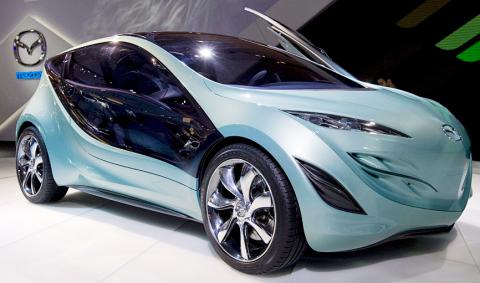Mazda Motor Corp has a creepy problem — a common spider species seems to have developed a hankering for making nests and weaving webs inside the engines of its sporty Mazda 6 sedan.
The Japanese automaker said on Thursday it would be recalling 65,000 vehicles in the US, Canada and Mexico to outfit them with special screens to keep the spiders out.
“There doesn’t seem to be any particular reason why he’s chosen the Mazda 6,” spokesman Jeremy Barnes said.

Photo: EPA
“It apparently likes to go zoom-zoom from the best we can tell,” he said with a laugh, in reference to Mazda’s advertising tag-line.
While the spider problem sounds silly, Barnes said it could be dangerous. The webs and nests can block air flow in the fuel tank’s vent and this could cause the tank to leak or even catch fire. So far there have been no accidents or fires, but Madza isn’t taking any chances.
Since the problem wasn’t restricted to a particular geographic region, Mazda thought it best to recall all its affected vehicles in areas where the yellow sac spider lives, Barnes said.
The problem was first discovered in October 2009 when a dealer found a spider web in a canister vent line when a customer brought their Mazda 6 in for repairs after it started leaking fuel.
The dealer investigated further and it was determined that the web blocked up the vent and caused “excessive vacuum” in the fuel tank, which “eventually resulted in a crack in the fuel tank through repetitive negative pressure stress,” Mazda said in filings with safety regulators.
Nineteen other spider nests have been discovered in Mazda 6 vehicles across the US, but only in the four-cylinder versions, so maybe it isn’t that sporty after all. Dealers will inspect all the vehicles for cracks, clean out the vents, install a “spring to prohibit spider intrusion” and reprogram the powertrain control module to avoid a build up of pressure in the tank.
In the latest defect recall to hit Japanese automakers, Honda Motor Co Ltd said on Thursday it was recalling almost 37,000 Civic Hybrids in the US.
Honda said a faulty converter in the hybrid control system could lead to the engine stalling and malfunction of the headlights.
No injuries or accidents have been reported in relation to the problem, which affects 2006 and 2007 models.
Chrysler Group is also recall nearly 250,000 vehicles in the US to fix an ignition key unit defect that can cause the engine to stall or shut off while driving, safety regulators reported on Thursday.
The defect affects last year’s models of the Chrysler Town & Country and Dodge Grand Caravan minivans, and Dodge Journey sport utility vehicles.

UNCERTAINTY: Innolux activated a stringent supply chain management mechanism, as it did during the COVID-19 pandemic, to ensure optimal inventory levels for customers Flat-panel display makers AUO Corp (友達) and Innolux Corp (群創) yesterday said that about 12 to 20 percent of their display business is at risk of potential US tariffs and that they would relocate production or shipment destinations to mitigate the levies’ effects. US tariffs would have a direct impact of US$200 million on AUO’s revenue, company chairman Paul Peng (彭雙浪) told reporters on the sidelines of the Touch Taiwan trade show in Taipei yesterday. That would make up about 12 percent of the company’s overall revenue. To cope with the tariff uncertainty, AUO plans to allocate its production to manufacturing facilities in

Taiwan will prioritize the development of silicon photonics by taking advantage of its strength in the semiconductor industry to build another shield to protect the local economy, National Development Council (NDC) Minister Paul Liu (劉鏡清) said yesterday. Speaking at a meeting of the legislature’s Economics Committee, Liu said Taiwan already has the artificial intelligence (AI) industry as a shield, after the semiconductor industry, to safeguard the country, and is looking at new unique fields to build more economic shields. While Taiwan will further strengthen its existing shields, over the longer term, the country is determined to focus on such potential segments as

TAKING STOCK: A Taiwanese cookware firm in Vietnam urged customers to assess inventory or place orders early so shipments can reach the US while tariffs are paused Taiwanese businesses in Vietnam are exploring alternatives after the White House imposed a 46 percent import duty on Vietnamese goods, following US President Donald Trump’s announcement of “reciprocal” tariffs on the US’ trading partners. Lo Shih-liang (羅世良), chairman of Brico Industry Co (裕茂工業), a Taiwanese company that manufactures cast iron cookware and stove components in Vietnam, said that more than 40 percent of his business was tied to the US market, describing the constant US policy shifts as an emotional roller coaster. “I work during the day and stay up all night watching the news. I’ve been following US news until 3am

COLLABORATION: Given Taiwan’s key position in global supply chains, the US firm is discussing strategies with local partners and clients to deal with global uncertainties Advanced Micro Devices Inc (AMD) yesterday said it is meeting with local ecosystem partners, including Taiwan Semiconductor Manufacturing Co (TSMC, 台積電), to discuss strategies, including long-term manufacturing, to navigate uncertainties such as US tariffs, as Taiwan occupies an important position in global supply chains. AMD chief executive officer Lisa Su (蘇姿丰) told reporters that Taiwan is an important part of the chip designer’s ecosystem and she is discussing with partners and customers in Taiwan to forge strong collaborations on different areas during this critical period. AMD has just become the first artificial-intelligence (AI) server chip customer of TSMC to utilize its advanced